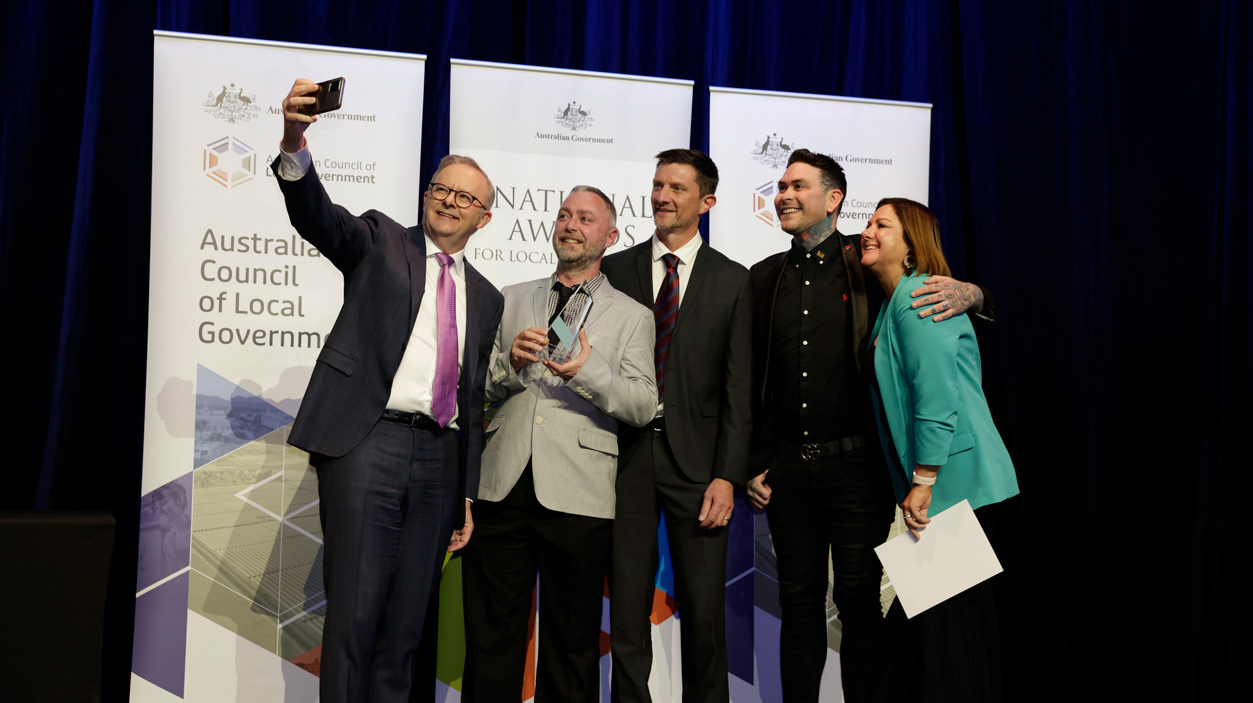
A publicly-funded Wi-Fi network set up to support tourists and provide free connectivity around the Tasmanian city of Launceston has emerged as an inspiring model of the power of public Wi-Fi – providing lifesaving links for some of the most disadvantaged communities in Australia.
The remarkable uptake of the City of Launceston’s Public Wi-Fi Service gained national recognition earlier this month, when it beat 14 other council projects to receive the prestigious Regional Growth Award from Prime Minister Anthony Albanese at the National Awards for Local Government.
The award was a validation of the farsighted planning of Launceston officials, and their selection of Easyweb Digital to build on the city’s existing fibre-optic network to provide a robust, high-speed Wi-Fi network for visitors and locals to access on their devices. The network has fanned out from the CBD, covering parks and public spaces, and delivering free Wi-Fi to over 1,500 digital devices daily – including in some of Australia’s most marginalised communities.
“The most rewarding part of our Wi-Fi project has been the expansion into our northern suburbs, where access to the Internet via NBN and 4G is some of the lowest in the country,” says Cameron Smith, City of Launceston’s City Innovation Project Officer. “When people don’t have 4G or NBN, free Wi-Fi becomes critical to doing a lot of things. This project has shown me just how essential digital connectivity is, and I’m so proud to be a part of it.”
At the Starting Point Neighbourhood House in Ravenswood, Manager Nettie Burr says: “Some people have described it as a ‘lifesaver’ being able to contact family, friends, job network providers, and employers outside of our Neighbourhood House hours. People also love the charging station, especially those sleeping rough or without power.”
At The Shed in neighbouring Rocherlea, regularly cited as one of the most disadvantaged neighbourhoods in the country, General Manager Trish O’Duffy says the Wi-Fi has “fostered a sense of belonging” for dozens of people who cannot afford or gain access to an Internet connection.
“Because the Wi-Fi is free, it’s ensured that everyone, regardless of their economic background, has equal access to information,” says Trish, adding that many residents also check the weather forecasts and emergency alerts – “so access to the Internet can be vital for public safety.”
Connectivity with privacy
Easyweb’s Wi-Fi solution not only provides robust outdoor Internet access and Open Roaming across the city, but industry-leading encryption to protect users’ privacy, and capabilities for Council to filter out inappropriate content. Users need only register once on a public log-in page, where Council can also provide public information, promote events, and engage with users through surveys.
In the latest survey last November, it emerged that most users in the suburbs of Waverley and Rocherlea were using the Wi-Fi to search or apply for work, access government services, connect with family, or undertake online studies. Almost half the survey respondents said they accessed the network multiple times each week.
“Without this service I'd not have contact with my son, who has addiction and mental health problems and can't afford to buy credit or data,” wrote one user. “His mental health issues stop him from answering the phone, but now we are able to messenger text.”
Originally launched in 2014, Launceston’s Wi-Fi network was significantly expanded in 2018 with funding from the Council’s City Heart Project, which saw Easyweb deploy 40 Ruckus Network access points to deliver wi-fi across the CBD and city parks. The following year, under the city’s My Place My Future initiative, a further 10 hotspots were added in seven northern suburbs – three of which have SEIFA (socio-economic index) scores in the lowest 2% nationwide.
According to Cameron Smith, partnerships with local community groups and regular user surveys have helped promote honest and transparent engagement with the community – which has naturally led to service improvements. “In the past we were just getting monthly reports on our Wi-Fi take-up, but Easyweb’s real-time metrics combined with direct community feedback has been a gamechanger,” he says. “The fact that [Easyweb sales engineer] Ben House is originally from Launceston was also a real bonus for our planning!”
Cameron says Easyweb’s cutting-edge hardware and cloud management platform, combined with their broad experience in installing community wi-fi networks, made them the perfect partner. “They have such a complete and compelling offering for this market. They even have portable 4G Wi-Fi stations that we can bring out for public events or emergency situations, and they were able to help us install public charging stations, and paint our cabinets to meet heritage regulations.”
“In the northern suburbs, this Wi-Fi is literally changing people’s lives,” adds Cameron. “When you add up the low rates of employment, poor connectivity, and the number of jobs that are only advertised online, it’s not hard to connect the dots. While activating public spaces and supporting tourism is a great thing, supporting those in need has been by far the most important outcome of this project.”
Picture: Prime Minister Anthony Albanese presents the Regional Growth Award to (L-R) Launceston City Innovation Project Officer Cameron Smith, with Team Leader Strategy, Economic Development & Analytics Alex Crothers, City of Launceston Mayor Matthew Garwood, and Minister for Regional Development, Local Government and Territories, Hon Kristy McBain.
